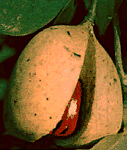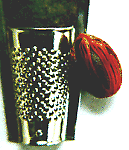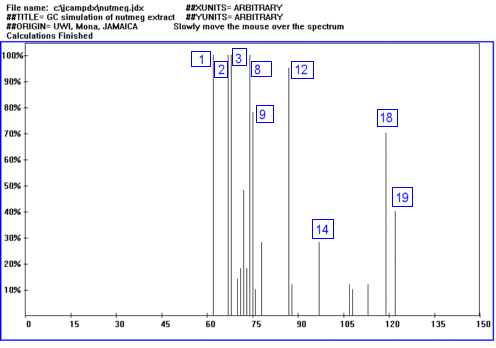Jamaican Nutmeg
In the West Indies, Grenada is perhaps better known for this spice than Jamaica,
however, the tree is grown here and there have been some recent studies on its chemistry
done in the Department.
The seed from the tree (Myristica fragrans) is called nutmeg and the yellow to red
aril covering the seed is called mace.


McCormicks consumer guide
has a few more details.
The annual production of nutmeg oil is around 300 tonnes and the major producers are
Indonesia and Sri Lanka. The major market is the USA (75%). Some European oil is distilled
from Grenadian nutmegs and in general the yield on steam distillation is about 11% oil.
A simulation of a GC/MS is given below
Selecting a numbered peak downloads the MS of that peak, selecting anywhere else downloads
the GC.

The volatile oil from the seed contains:
- (2902) alpha-pinene PDB or MS
- sabinene PDB or
MS
- (2903) beta-pinene PDB or MS
- alpha-phellandrene PDB
- delta-carene
- alpha-terpinene PDB
- (2356) para-cymene PDB or MS
- (2633) limonene PDB or MS
- (3559) gamma-terpinene PDB
- trans-sabinenehydrate
- (3046) terpinolene
- (2248) terpinen-4-ol PDB or MS
- (3045) terpineol PDB
- safrole MS
- (2475) methyleugenol PDB
- alpha-copaene
- beta-caryophyllene PDB or MS
- myristicin PDB or MS
- elemicin MS
among the major ingredients. The numbers in brackets are the FEMA codes (Flavor and
Extract Manufacturers' Association of the USA).
The myristicin component is insecticidal and is thought to contribute to the
hallucenogenic properties of the extracts. It is normally lower in oil distilled from West
Indian nutmegs.
Antibacterial eugenol and lignan-types of
constituents of the nuts are anti-carcinogenic.
Safrole is suspected of being toxic (carcinogenic)?
Most of the production of nutmeg oil is for use in cola flavours with smaller amounts used
in meat seasonings and bakery products.
Reference:
"Food Flavourings", Edited by P.R. Ashurst, Blackie Academic & Professional,
an imprint of Chapman & Hall, Wester Cleddens Road, Bishopbriggs, Glascow, G64 2NZ,
UK. 2nd edit. 1995.
Return to links to the chemistry of other Jamaican items,
including spices and fruit and vegetables.
Created and maintained by Dr. Robert J. Lancashire,
The Department of Chemistry, University of the West Indies,
Mona Campus, Kingston 7, Jamaica.
Created Feb 1995. Last modified 21st April-98.
URL http://wwwchem.uwimona.edu.jm:1104/lectures/nutmeg.html


